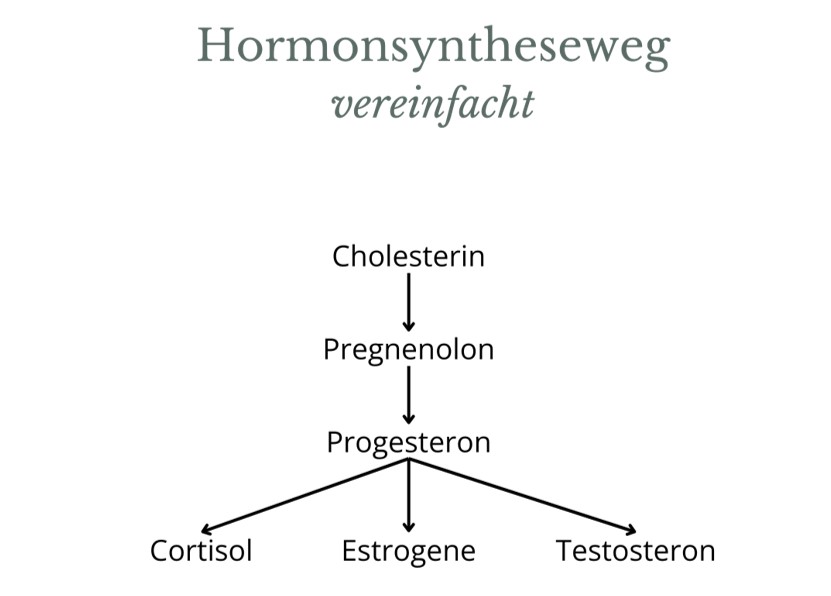
In diesem Artikel wird erklärt, wie sich Stress auf unseren Menstruationszyklus auswirkt und warum die Nebennieren ein wesentlicher Bestandteil der weiblichen Gesundheitsvorsorge sind. Wir befassen uns mit dem Phänomen des Progesteron-Stahls und wie er den Menstruationszyklus beeinflusst.
Beispiele dafür, was wir als typische Stressoren ansehen
- Schlafmangel
- Nicht genügend Nährstoffe / Nahrung
- Übermäßiger Verzehr
- Mangel an Bewegung
- Zu viel oder zu einer suboptimalen Tageszeit trainieren
- Mangelnde Entspannung
- Krankheit
- Extreme Hitze oder Kälte
- Emotionaler/psychologischer Stress
Die beteiligten Hormone
- Östrogene: Östrogene dominieren in der ersten Phase des Zyklus, wenn ein Follikel wächst. Sie werden hauptsächlich in den Eierstöcken produziert.
- Progesteron: In der zweiten Phase dominiert das Progesteron, das die Durchblutung der Gebärmutter sicherstellt. Es wird hauptsächlich vom Gelbkörper produziert – dem Teil des Follikels, der nach dem Eisprung in den Eierstöcken verbleibt.
- Cortisol: Ein Hormon, das von den Nebennieren produziert wird und oft als “Stresshormon” bezeichnet wird, weil es dem Körper hilft, auf Stress zu reagieren.
- Pregnenolon: Dies ist ein Vorläuferhormon, d. h. es ist ein Baustein für andere Hormone. Man kann es sich als das Rohmaterial vorstellen, das zur Herstellung mehrerer wichtiger Hormone benötigt wird, darunter Progesteron und Cortisol.
Progesteron stehlen
Um den Progesteronabbau zu verstehen, müssen wir uns zunächst die Hormonsynthese ansehen. Wie Sie in der Abbildung unten sehen können, ist Pregnenolon ein Vorläuferhormon für viele Steroidhormone wie Progesteron, das dann weiter zu Östrogenen, Testosteron oder Cortisol synthetisiert wird.

Picture 1: Hormone synthesis (simplified)
Acute stress primarily moves through the catecholamine axis (adrenaline / noradrenaline) but once it becomes chronic or too much, cortisol rises.
Our body is very smart and prioritizes survival over thriving.
Cortisol is the hormone to ensure survival. Many people talk about cortisol as if it was something negative, but it actually does many important things like increase heart and breathing rates, it decreases inflammation responses in the body and increases concentration. While it is important and helps us survive, it has a negative impact on our menstrual cycle.
Our menstrual cycle is part of thriving. If we are in survival mode (=stress mode), cortisol is prioritized over hormones like progesterone. Because they have the same precursor (pregnenolone) that means in the end, there’s not enough progesterone produced for a healthy cycle. We see this mostly as relative estrogen dominance caused by a lack of progesterone. This means we don’t have enough progesterone which leads to a disbalance between estrogen and progesterone. The symptoms can include PMS, tender breast, migraines, decreased sex drive, irregular periods and fertility issues.
So treating our stress response and the adrenal glands that produce cortisol is a very important part of treating menstrual cycle disorders as well as fertility issues.
How to address stress and the adrenal glands
There are many areas in which we can address the stress response and thus the adrenals. Here are some examples:
- Lifestyle: Meditation and mindfulness can impact stress levels. Sleeping regularly and enough stabilizes the circadian rhythm and thus the stress response. Exercise and massage can also support stress management.
- Nutrition: Eating regularly and warm including different vegetables and fruit, as colorful as possible, healthy fats and including blood type specific proteins help regulate the stress response. Supplementing B-vitamins as well as magnesium support a stable metabolism and nervous system and with that stress resilience.
- Herbal support: Plants that support the nervous system like lemon balm or common hop help stress management. Depending on the constitution, adaptogens can be indicated.
If you are ready to get your personalized treatment plan to address stress and with that menstrual cycle issues, book your free consultation with us.



